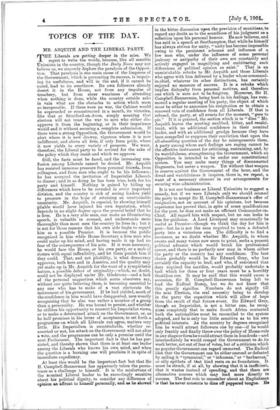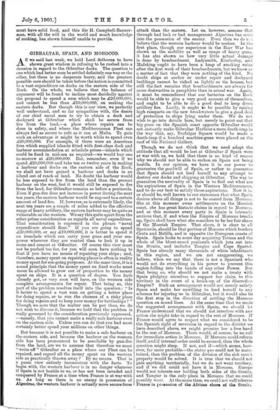TOPICS OF THE DAY.
MR. ASQ u et AND THE LIBERAL PARTY. THE Liberals are getting deeper in the mire. We regret to write the words, because, like all sensible Unionists in the country, though the Daily News may not believe us, we sincerely deplore the paralysis of the Opposi- tion. That paralysis is one main cause of the limpness of the Government, which is preventing its success, is impair- ing its usefulness, and will in the end, if it cannot be cured, lead to its overthrow. Its own followers already desert it in the House, not from any impulse of treachery, but from sheer weariness of attending when nothing is done, while the country outside asks in vain what are the obstacles to action which seem so insuperable. If there were no war, the Cabinet would be superseded or reconstructed in a month, its victories, like that at Stratford-on-Avon, simply meaning that electors will not trust the war to men who either dis- approve it from the beginning, or in their impatience would end it without securing a complete submission. If there were a strong Opposition, the Government would be alert where it is now drowsy, vigorous where it is now indifferent, and above all firm, if only from pride, where it now yields to every variety of pressure. We want, therefore, the Liberal party to be revived for the sake of the policy which they resist and which we approve.
Still, the facts must be faced, and the increasing con- fusion among Liberals cannot be denied. Mr. Asquith has resisted immense pressure from personal friends, from colleagues, and from men who ought to be his followers ; he has accepted the invitation of Imperialist Liberals to dinner ; and in so doing he has been wise, both for his party and himself. Nothing is gained by hiding up differences which have to be revealed in every important division, and the country is sick of seeing leaders yield to pressure in the hope of attaining an unattainable unanimity. Mr. Asquith, in especial, by showing himself pliable would have injured his own reputation, which depends in no slight degree upon the general belief that he is firm. He is a very able man, can make an illuminating speech, is valuable in counsel, and understands more thoroughly than most men the country he lives in ; but it is not for those reasons that his own side begin to regard him as a possible Premier. It is because the public recognised in him while Home Secretary a firm man who could make up his mind, and having made it up had no fear of the consequences of his acts. If it were necessary, he would face the House, or his own party, or a mob of rioters with equal inflexibility, and let them punish him if they could. That, and not pliability, is what democracy approves, both here and in America, and the quality may yet make up in Mr. Asquith for the want of a sympathetic nature, a possible defect of originality—which, no doubt, could not be displayed under Mr. Gladstone—and a lack of the personal magnetism which acute observers say, without our quite believing them, is becoming essential to any one who has to make of a vast electorate the instrument of his government. If he had yielded, much of the confidence in him would have disappeared, men wearily recognising that he also was rather a member of a group than a personality. He was bound to persist, and whether he utilises his opportunity to reassert his Imperialist views, or to make a determined attack on the Government, or, as he half promises in his letter of acceptance, to set forth a programme on which all Liberals can agree, matters very little. His Imperialism is unmistakable, whether re- asserted or not, his attack on the Government will not alter a vote, and the programme can be only a promise until the next Parliament. The important fact is that he has per- sisted, and thereby shown that there is at least one leader among the Liberals who knows his own mind, and when the question is a burning one will proclaim it in spite of immediate expediency.
At least this would be the important fact but that Sir H. Campbell-Bannerman has apparently taken the persis- tence as a challenge to himself. It is the misfortune of the nominal Liberal leader to be exceedingly sensitive about his political dignity, to consider any difference of opinion an affront to himself personally, and as he showed in the bitter discussion upon the prevision of munitions, to regard any doubt as to the soundness of his judgment as a reflection upon his personal honour. He now believes, and has said in a speech at Southampton, that while he himself has always striven for unity, " unity has become impossible owing to the persistent schemes and influence of a few men who, under the influence of some personal jealousy or antipathy of their own are constantly and actively engaged in magnifying and embittering such differences of political opinion as exist." That is an unmistakable rebuke to Mr. Asquith and those Liberals who agree with him delivered by a leader whose command- in-chief, whatever its other distinctions, has certainly enjoyed no measure of success. It is a. rebuke which implies disloyalty from personal motives, and therefore one which is sure not to be forgiven. Moreover, Sir H. Campbell-Bannerman, being hurt in his feelings, has sum- moned a regular meeting of his party, the object of which must be either to announce his resignation or to obtain a renewed vote of confidence from all Liberals. If that is refused, the party, at all events for the moment, " goes to pie." If it is granted, the section which is to " dine ' Mr. Asquith leaves the meeting snubbed, bitter, and recalci- trant, with no additional confidence in their nominal leader, and with an additional grudge because they have been compelled to suppress their conviction that upon the all-absorbing question of the day he misrepresents them. A party among whom such feelings are raging cannot be the effective instrument for criticising, restraining, and, by its watchfulness, strengthening the Government, which an Opposition is intended to be under our constitutional system. You may make many things of disconnected fragments, but never a weapon. Yet without that weapon in reserve against the Government of the hour, and the dread and watchfulness it inspires, there is, we repeat, a want of a necessary element in our arrangements for securing wise administration.
It is not our business as Liberal Unionists to suggest a remedy, but if we were Liberals only we should counsel the party to accept Sir H. Campbell-Bannerman's offer of resignation, not on account of his opinions, but because experience has proved that, in spite of some qualifications for the post, he does not make an efficient Commander-in- Chief. All regard him with respect, but no one looks to him for guidance. A Lord Liverpool may occasionally be useful as Premier—though we think the day for him is past—but he is not the man required to turn a defeated party into a victorious one. The difficulty is to find a successor, as we doubt whether Mr. Asquith, to whom events and many voices now seem to point, seeks a present political advance which would break his professional career, and there is no perfectly new man in whom either the party or the country has any confidence. The best choice probably would be Sir Edward Grey, who has certainly the capacity to lead, and who, if convinced that duty required the sacrifice, would probably undertake a task which for three or four years must be a horribly thankless one. It may be said that this would cause a secession, Sir H. Campbell-Bannerman being left to lead the Radical Rump, but we do not know that this greatly signifies. Numbers do not signify till the next Election, the real necessity being to develop in the party the capacities which will allow of hope from the result of that future event. Sir Edward Grey, though an Imperialist, is not a bitter one, he recog- nises completely that to make South Africa contented both the nationalities must be reconciled to the system adopted, and he is only too little sensitive as to his own political interests. As the country by degrees recognised him he would attract followers one by one—if he would only frankly and finally throw over the policy of Home-rule in any shape orform hewould attract them in hundreds—and intermediately he would compel the Government to do its work better, not out of fear of votes, but of a criticism which no popular Government can regard unmoved. The Radical idea that the Government can be either coerced or defeated by calling it " tyrannical," or " inhuman," or " barbarous," or silly epithets of that kind rests on no foundation. It must be struck, if at all, by showing that it is inefficient, that it wastes instead of spending, and that there are alternative courses which may lead more directly to success. The first rule to remember about an Englishman is that he never consents to dine off peppered tongue. He must have solid food, and this Sir H. Campbell-Banner- man, with all the will in the world and much knowledge of cooking, has shown himself unable to provide.



















































 Previous page
Previous page